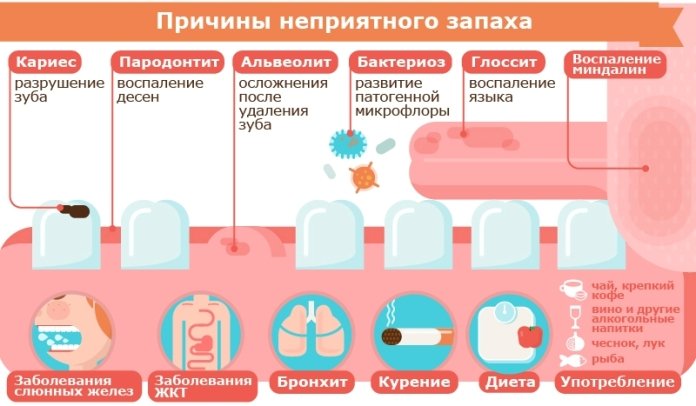Eliminate putrid odor from the mouth
A common symptom - putrid breath - occurs in both adults and children, indicating the presence of pathological processes in the body.
Bad breath can be caused by both dental problems and diseases of the internal organs.
The causes and treatment of pathologies are closely related, so timely access to a doctor and high-quality diagnostics are of great importance.
Should I be worried?
Every person has experienced bad breath at least once, and this is normal - bad breath often appears as a result of natural processes in the body.
Not pronounced occasionally appearing bad breath is one of the variants of the norm.
But in some cases, the stench is a symptom of a developing pathology. Often the appearance of putrid breath is caused by dental reasons, including poor oral hygiene. Sometimes bad breath appears due to a malfunction of the internal organs.
You need to worry when the symptom is permanent and is accompanied by other unpleasant sensations - pain or discomfort (bloating, belching, nausea, and others like them), which indicate current pathological processes.
A strong smell of rot from the mouth as a symptom has received a special name - halitosis.
There are several types of halitosis:
- true halitosis - real-life changes in the pathological nature of the smell from the mouth, which are objectively noted by other people;
- pseudohalitosis is the usual bad breath, which can be caught only by close contact with a person. As a rule, such a problem is exaggerated by the person himself and is easily corrected by observing hygiene standards or correcting the diet;
- Halitophobia is a common phenomenon when a woman or a man, as a result of personality traits, begins to be afraid of a really non-existent smell from the mouth. At the same time, people around and even doctors do not find deviations from the norm.
True halitosis is regular. The mouth stinks either at certain times (in the morning or on an empty stomach during the day) or constantly.
When halitosis occurs, it is necessary to seek help from a specialist so that he determines the exact cause of the symptom, whether it is caused by dental reasons or pathologies of internal organs.
The main factors in the appearance of physiological halitosis include plaque and food debris in the oral cavity, in the root zone of the tongue, on the teeth and between them.
Normally, saliva should cleanse the oral cavity, reducing vigorous activity and maintaining the number of microorganisms within the normal range.
Poor hygiene and plaque build-up encourages the development of bacteria that produce hydrogen sulfide. It is hydrogen sulfide that gives the breath an unpleasant odor.

At night, during sleep, saliva in the oral cavity is produced in smaller quantities than during the day, as a result of which the bacteria manifest themselves more actively. A foul-smelling plaque appears on the teeth and tongue.
That is why the smell of the mouth in a child or an adult in the morning becomes unpleasant, but both children and older people can cope with bad breath by following the usual rules of hygiene, rinsing the mouth or cleaning the tongue and teeth.
In pathological processes, the stench is more difficult to eliminate, and ordinary manipulations do not help to cope with bad breath, which returns again and again.
Bad breath and strong breath cause gum disease, tonsil disease, throat disease, or a decaying tooth.
But often the reason why it smells from the mouth is diseases of the internal organs - especially the pathology of the gastrointestinal tract.
With a disease of different organs - the stomach, liver, intestines, respiratory system or kidneys - the smell from the mouth may differ.
You can identify the causes of the problem based on the accompanying symptoms - pain in the side, toothache, bloating, upset stool, or others like them.
Extraoral causes of halitosis include:
- diabetes;
- diseases of the excretory system, liver and biliary tract;
- infectious lesions of the nasopharynx and areas adjacent to the oral cavity - sinusitis, tonsillitis, adenoiditis and other similar diseases;
- diseases of the gastrointestinal tract - the presence of gastritis, gastroduodenitis, dysbacteriosis, stomach ulcers, pancreatitis, insufficiency of sphincters, provoking the development of reflux, are significant factors for the appearance of stench on an empty stomach and even after eating.
What is the smell from the mouth?
The occurrence of putrid odor from the mouth as a result of the multiplication of pathogenic bacteria and their increased activity is called ozostomy.
The symptom deserves attention and requires treatment. The dentist will help to examine the oral cavity and determine the cause of the pathological processes.
The taste of a rotten egg and the smell of hydrogen sulfide most often indicate digestive problems, along with other intestinal symptoms - bloating, white coating on the tongue, pain in the stomach and mediastinum. As a rule, such signs indicate the development of gastritis or stomach ulcers.
The presence of a sour taste and stale breath, which appears even after eating, occurs as a result of some forms of gastritis.
Bitterness in the oral cavity, independent of the human diet, is a sign of impaired functioning of the liver and gallbladder.
With the development of liver pathologies, the mouth smells of rot. As a rule, the symptom is accompanied by pain in the right hypochondrium, which is caused by inflammatory processes.
Another specific sign of the development of pathology is the sweet taste in the mouth and the accompanying smell of acetone.
Similar symptoms indicate possible metabolic disorders, such as diabetes.
Pathology begins to develop imperceptibly - painlessly and without pronounced symptoms, the presence of which indicates an already significantly developed disease.
Dentistry with a taste and smell of acetone is one of the very first signs of diabetes mellitus, in which you should consult a doctor for a diagnosis.
In case of disturbances in the functioning of the excretory system and inflammatory processes in the kidneys, cystitis, polyneuritis, stones or other pathologies of the genitourinary system, an ammonia smell may appear in the mouth that does not disappear after a snack or after oral hygiene.
Solution
The first step is to evaluate the breath and determine if there is indeed a problem, or if the breath deficiencies were contrived. You can do it yourself or ask a friend.
For self-assessment, you can use dental floss, which should be smelled after use, when it is already dry. Another way is to lick an area on the skin of the hand and evaluate the smell after the saliva dries.
There is a special device - a halimeter, which evaluates the amount of hydrogen sulfide in the exhaled air.

The device evaluates the gas content according to a 4-point system. This pocket-sized device can be used independently if necessary.
Special professional devices are also available in doctors' offices. They are ultra-sensitive and will help to accurately assess the composition of the exhaled air.
Having convinced yourself that breathing problems do exist, but without feeling other unpleasant symptoms that indicate developing pathologies, you should first try to solve the problem by changing your diet, adhering to healthy eating habits, and maintaining oral hygiene.
It is necessary to brush not only your teeth every day, but also your tongue, especially in its root zone. To do this, you should use a toothbrush, but for those who are uncomfortable, you can use other means - special scrapers and rinses that reduce the number of bacteria in the mouth. It is advisable to rinse your mouth every time after eating.
If the disease is caused by pathologies of the internal organs, then the diet can reduce the manifestation of symptoms.
But some diseases require serious treatment. To choose the right therapy strategy, you should undergo a diagnosis.
To do this, you first need to contact a therapist, who, based on general symptoms and tests, will refer you to a narrower specialist, based on the primary diagnosis.
Most likely, you will have to take blood and stool tests to detect the presence of infection and inflammatory processes in the body.
A timely visit to a doctor and treatment of the underlying disease will help get rid of an unpleasant symptom, and most importantly, it will allow you to take control and prevent the further development of pathological processes, while maintaining health.



